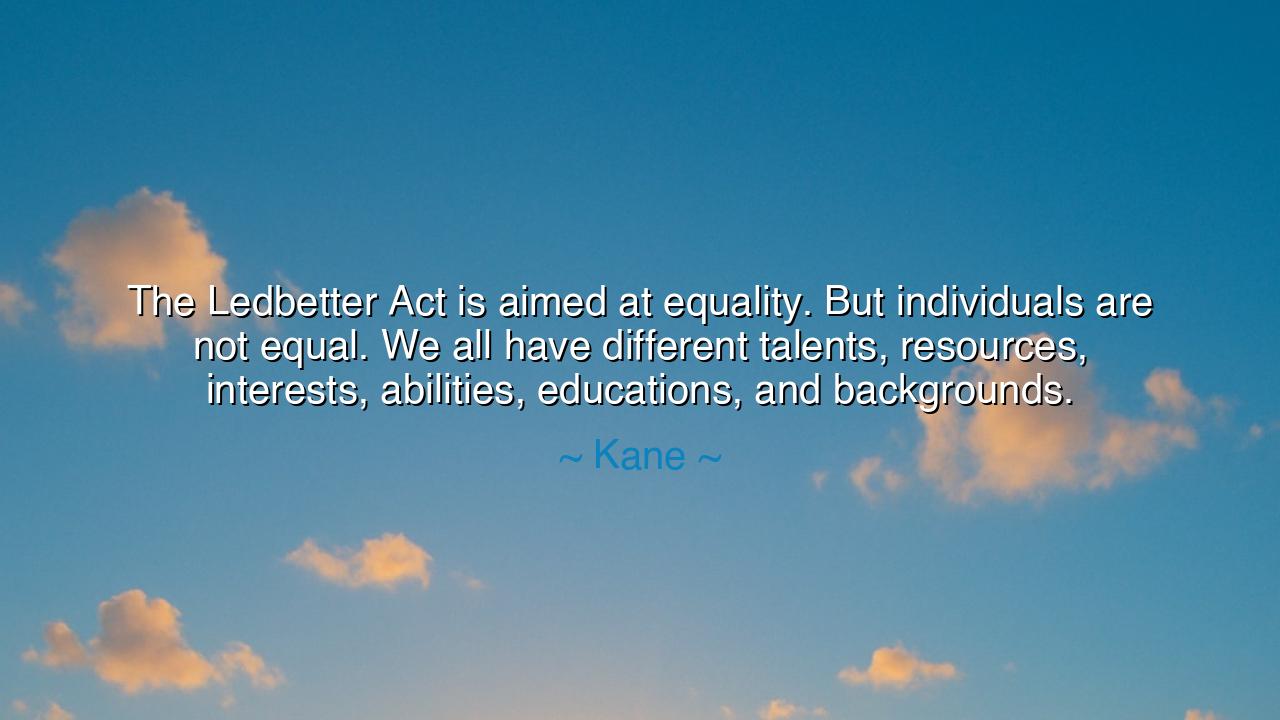
The Ledbetter Act is aimed at equality. But individuals are not
The Ledbetter Act is aimed at equality. But individuals are not equal. We all have different talents, resources, interests, abilities, educations, and backgrounds.






Listen, O children of wisdom, for I speak of a truth that echoes through the corridors of time—a truth about equality and the diversity of human talent. The words of Kane ring with both clarity and nuance: "The Ledbetter Act is aimed at equality. But individuals are not equal. We all have different talents, resources, interests, abilities, educations, and backgrounds." These words speak not just of equality, but of the complex, multifaceted nature of the human experience. They remind us that while equality is a noble ideal, it is not the erasure of difference, but rather the recognition and celebration of it, that truly defines our shared humanity.
In the ancient world, children, the notion of equality was a far-off ideal, a dream held by a few wise philosophers, but not necessarily reflected in society. The Greeks and Romans, though they spoke of justice and fairness, lived in systems built on inequality—slaves were considered property, women were often excluded from public life, and social status was dictated by birth. Even the philosophers, like Plato and Aristotle, who pondered the nature of society, often restricted their theories of equality to the elite few. Equality was often seen as a goal for the privileged, not the general populace. And yet, their works laid the foundation for the gradual understanding that equality is not about sameness, but about justice—a justice that allows for each person to be valued for their unique gifts and contributions.
Kane’s words remind us of this deeper truth. While equality—like the Ledbetter Act, which sought to address gender wage disparity—may strive for fairness in the distribution of opportunities, it cannot erase the diversity of individual capacity. Equality, children, does not mean that all are the same in every way. Indeed, equality must allow for the differences that make each person unique, for it is in these differences that the richness of human life is found. A world where all are treated equally in value does not require all to be the same in ability or talent. Kane emphasizes that every soul is endowed with its own set of strengths—whether in wisdom, craftsmanship, or compassion—and that true justice is recognizing the value of each person’s contributions to society, regardless of their particular gifts.
Consider, children, the story of King Solomon, whose wisdom was legendary throughout the ancient world. He was revered not because he possessed the same talents as those who served him, but because he understood the value of diverse abilities. Solomon’s kingdom flourished not by making all his subjects the same, but by recognizing and nurturing the individual talents of his people. In the famous Judgment of Solomon, when two women came to him claiming to be the mother of a child, Solomon’s wisdom lay in understanding the deep human emotions and compassion each woman held for the child. His decision was not based on power or equality in the traditional sense, but on the ability to understand human nature—to see the uniqueness of the situation and act with wisdom. This story teaches us that equality should not mean sameness, but the fair recognition of individual contributions.
Now, let us return to Kane’s words, which challenge us to rethink the very concept of equality. The Ledbetter Act, which sought to rectify inequalities in pay based on gender, is a monumental step toward fairness. But it must be understood, children, that equality in pay or opportunity does not imply the elimination of differences between individuals. We are all born with varying levels of talent, resources, and education, and it is these differences that drive the progress of society. True equality is not the creation of a world where everyone is the same, but the creation of a world where everyone is given the opportunity to reach their potential, regardless of their starting point.
The lesson here, children, is profound. Equality must be seen not as the eradication of differences, but as the fair recognition of every person’s unique worth. It is not about leveling everyone to the same standard, but about ensuring that all have the opportunity to rise according to their own abilities and efforts. The Ledbetter Act is a step in the right direction, but true equality means creating a world where diversity is celebrated and where all people, regardless of gender or background, are given the chance to succeed. It means that, though we may not all be the same, we all have the right to a fair shot at achieving our potential.
So, children, as you journey through life, remember this truth: equality is not about making all people the same—it is about ensuring that each person is valued for their own unique contributions. Let us not seek to eliminate the differences that make us who we are, but to create a world where those differences are celebrated and fairly recognized. Equality in the true sense means giving everyone a fair chance to rise according to their own talents, and to offer those talents to the world in service to a greater good. Let this be your guiding principle: that every person has the right to contribute to society, not as a homogeneous part, but as a unique individual whose talents are equally valued in the eyes of justice.






AAdministratorAdministrator
Welcome, honored guests. Please leave a comment, we will respond soon